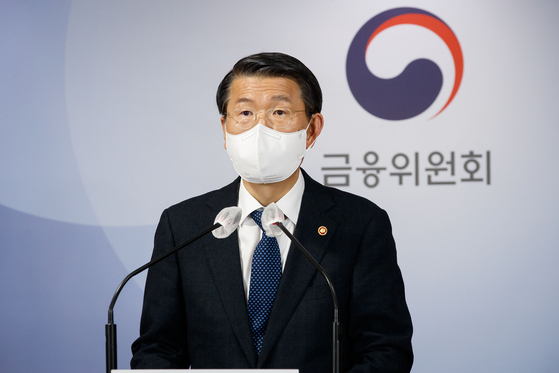“Short selling should not be viewed as the cause of the stock price decline.”
The main reason why the financial authorities pulled out the ban on short selling and the partial resumption card in May is’minimizing market shock’. Individual investors are concerned that resuming short selling will cause a shock to the stock market by spilling their balances. The balance balance is the amount waiting for short selling, and is the valuation of stocks that the investor has not paid back after borrowing. This amount is about 51 trillion won as of the 3rd. Some argue that if short selling resumes, “the KOSPI will fall to the 2000 line.”
But experts dismissed it as “a radical argument.” Resuming short selling does not change the market trend.

Finance Commissioner Eun Seong-soo is announcing the partial resumption of short selling at the joint briefing room of the Seoul Government Complex in Jongno-gu, Seoul on the 3rd. yunhap news
◆There is no shock when looking at past examples= In the past, short selling was temporarily banned twice in 2008 and 2011. During the 2008 global financial crisis, short selling of all stocks was banned for eight months from October of that year to May 2009. On June 1, 2009, when short selling resumed, the KOSPI recorded 1415.1, up 1.38% from the previous day, and maintained a similar level a month later.
Even in 2011, when short selling was banned for three months in the aftermath of the European fiscal crisis, the impact on the market was not significant. On November 10, 2011, when short selling resumed, the KOSPI fell 4.94% from the previous day, but recovered to the level just before the reopening in three weeks.
A study conducted by the Capital Market Research Institute in 2017 also showed that short selling did not exert much power on the stock price movement. From July 2008 to October 2016, the researcher estimated the correlation coefficient between the share of short selling volume and the stock price return in the KOSPI market at -0.0389. The correlation coefficient is a number expressed as a value between -1 and 1, and the closer to 0, the lower the correlation. The researcher analyzed that “the absolute value of the correlation coefficient is low, so it can be inferred that the effect of the short selling transaction on the stock price flow is small.”
It is similar when looking at overseas cases. Gil-nam Nam, head of the Capital Markets Research Institute, said, “The yield (21.3%) during the ban period (21.3%) in countries prohibited from short selling, such as Spain and Italy, the 1-day return (-1.9%) immediately after release, and the 5-day return (0.6%) immediately after release, allowed short selling. “There wasn’t much difference between the US and UK returns in the same period.”

Trends in waiting for short selling. Graphic = Reporter Kim Kyung-jin [email protected]
◆How the stock market movesEven with this claim, individual investors point out that “the situation is different from the past.” Since the short selling was banned in March last year, the KOSPI has soared more than 70%, so the fall could be large.
Lee Jin-woo, head of the investment strategy team at Meritz Securities, said, “The soaring stock price was not only due to the ban on short selling, but the result of abundant liquidity, economic recovery expectations, and corporate profit growth.” “(Resumption of short selling) will not have a significant impact on the market.” said. Kim Ji-san, head of the Research Center at Kiwoom Securities, also predicted, “There may be adjustments at a level where the burden on valuation (share price relative to corporate value) is eased, but we do not believe that the market will plunge only by supply and demand factors.”

The Korea Stock Investment Association (Han Tu-yeon), a group of individual investors, is running a bus with words such as’Abolition of short selling’ and’Dismantling of the Financial Services Commission’ to campaign against short selling in Sejongno, Seoul on the 1st. yunhap news
The resumption of short selling, mainly large-cap stocks, is the reason we expect the impact on the stock market to be modest. On May 3, short selling will resume for only 350 stocks belonging to the KOSPI 200 and KOSDAQ 150 indexes. Hwang Se-woon, a research fellow at the Capital Market Research Institute, said, “Large stocks such as Samsung Electronics have a strong fundamental (basic physical strength), so it is unlikely that short selling will be concentrated,” said “stock prices have no choice but to follow corporate values as seen in the US game stop case.” Said.
In this case, there are opinions that you should aim for an investment’niche’. KB Securities researcher Min-gyu Kim said, “It is not listed in the KOSPI 200 or the KOSDAQ 150, but we should pay attention to the stocks that have a large market cap and active short selling.” “I said.
Reporter Hwang Eui-young [email protected]
